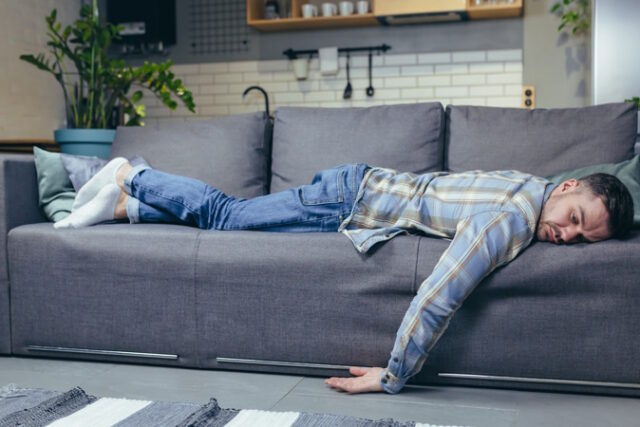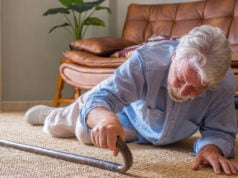
By Tony Hicks — Fact checked by Jennifer Chesak
Researchers say midday naps of more than 30 minutes may be connected to higher body mass index, higher blood pressure, and conditions associated with heart disease and diabetes.
However, what many call “power naps” – a midday sleep session of 30 minutes or less – were less likely to have elevated blood pressure.
In a new study published in the journal Obesity, researchers from Brigham and Women’s Hospital in Boston, assessed more than 3,000 adults from a Mediterranean population – where midday naps known as “siestas” are common.
The researchers examined the relationship of siestas and their duration with obesity and metabolic syndrome.
Researchers reported that people taking siestas of 30 minutes or longer were more likely to have a higher body mass index, higher blood pressure, and other conditions associated with heart disease and diabetes compared to people who took no naps.
In addition, those taking short naps were less likely to show elevated systolic blood pressure than those who took no siestas.
“Not all siestas are the same,” Marta Garaulet, PhD, MS, a senior study author and a visiting professor in the Division of Sleep and Circadian Disorders at Brigham and Women’s Hospital, said in a statement. “The length of time, position of sleep, and other specific factors can affect the health outcomes of a nap.”
Garaulet said the team did a previous study in the United Kingdom that found siestas were associated with an increased risk of obesity. The next step was to look at siestas in a country where midday naps were a bigger part of the culture.
“In this case, Spain, as well as how the length of time for siestas is related to metabolic health,” Garaulet said.
The team points out obesity is a growing health concern affecting more than 1 billion people around the world.
Fat accumulation in the body connects to how people digest food during metabolic processes. Researchers said examining how lifestyle choices, like taking naps, affect these metabolic mechanisms could help researchers understand how habits influence health.
The team examined data from 3,275 adults in the Spanish region of Murcia.
They measured baseline metabolic characteristics of participants at the University of Murcia and collected details regarding their naps and other lifestyle factors.
They divided the subjects into categories of no siestas, shorter than 30 minutes, and longer than 30 minutes.
Subjects taking longer naps had a higher body mass index and were more likely to have metabolic syndrome (MetS) than those who did not take siestas.
Compared with the no-siesta group, the long nap group had higher values of waist circumference, fasting glucose levels, systolic blood pressure (SBP), and diastolic blood pressure.
Longer siestas were associated with later nightly sleeping and eating, increased energy intake at lunch, and cigarette smoking.
Becca Krukowski, PhD, a professor at the University of Virginia School of Medicine, told Medical News Today there’s been plenty of research on sleep and obesity.
“However this article adds knowledge about sleep and health risks in a cultural context where napping is encouraged among healthy individuals, across the lifespan, while also considering other potentially related factors, such as nap length and eating patterns.” Krukowski said.
Krukowski added it’s possible the longer naps are the result of the health problems, not the other way around.
“This is a cross-sectional study, thus the direction of these relationships cannot be determined from this study. It is possible that people with obesity are sleeping more poorly in the night and thus have a greater need for naps.”
Krukowski noted the study could be a step toward more revealing research.
“Previous studies have shown that weight loss interventions improve sleep quality,” Krukowski said. “It may be interesting to examine whether sleep interventions – including managing nap length (and) improving nighttime sleep – improve weight.”
The study authors acknowledged it’s possible some factors may be a consequence of obesity and not siestas per se, as a previous study of data collected in the UK Biobank pointed to a causal relationship between napping and obesity, particularly with abdominal obesity, which authors call the most detrimental form.
The authors said they found a variety of statistically significant lifestyle factors mediating the association between siestas and health measures.
They call for future research into whether a short siesta is advantageous over a long one, particularly for those with habits such as having delayed meals and sleep schedules, or for those who smoke.
“This study shows the importance of considering siesta length and raises the question whether short naps may offer unique benefits,” Frank Scheer, PhD, a senior neuroscientist and professor in the Medical Chronobiology Program in the Brigham’s Division of Sleep and Circadian Disorders, said in a statement. “Many institutions are realizing the benefits of short naps, mostly for work productivity, but also increasingly for general health.”
Disclaimer
The information contained in South Florida Reporter is for general information purposes only.
The South Florida Reporter assumes no responsibility for errors or omissions in the contents of the Service.
In no event shall the South Florida Reporter be liable for any special, direct, indirect, consequential, or incidental damages or any damages whatsoever, whether in an action of contract, negligence or other tort, arising out of or in connection with the use of the Service or the contents of the Service. The Company reserves the right to make additions, deletions, or modifications to the contents of the Service at any time without prior notice.
The Company does not warrant that the Service is free of viruses or other harmful components
This article originally appeared here and was republished with permission.












